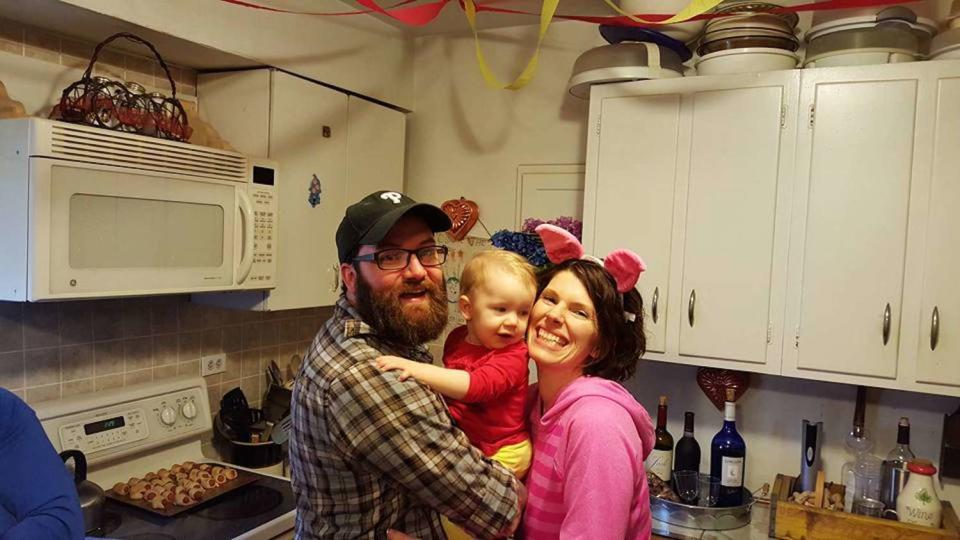How I Raise 2 Kids While $28K in Debt
The question of whether or not we were financially prepared to have children came up in conversation a lot before my husband and I started trying. We plotted our bills and income on an Excel spreadsheet, and fiddled around with the numbers to see if we could make it work. The running joke in my family has always been that if you wait until you can afford to have a baby, you'll never actually have one. It's a joke with a ring of truth: if we had decided to hold off until our finances were in perfect condition, we'd probably still be childless.
Instead, we waited until our finances were good enough, and in 2014 we gave birth to our first daughter. At the time, we assumed that I would be returning to my job in the mortgage industry after my six-week unpaid maternity leave finished and my husband would leave his warehouse job to become a stay-at-home-dad. Instead, after a complicated labor and delivery left me in need of a lengthy recovery period, I ended up extending my leave by six more unpaid weeks. In order to make that work, we dug deep into our $5,000 savings, practically emptying it out in our first 12 weeks as new parents living in Bucks County, Pennsylvania.
It was around that time that my grandmother got sick and asked if she could hire me to be her full-time caregiver for a few hundred dollars a week. The position allowed me to bring my newborn along (saving me the expense of daycare) while I took care of my grandmother's every need. It was a win-win for everyone. Just like that, all of our plans changed. My husband stayed on with his company and I was the one who transitioned into a stay-at-home role.
Our savings account slowly refilled, and we kept all of our previous budget cuts in place (like cutting cable, dining in, and foregoing any big purchases), giving us enough breathing room to feel confident about expanding our family further. We found out that I was pregnant with our second daughter in the summer of 2016. By the fall, everything began to change, and it was almost like our previous money troubles were foreshadowing what was to come.
How we fell into debt
There was no one major thing that took us off course after our second kid was born. Like many people living in our situation, it was a series of small things that built up quickly. My grandmother passed leaving me not only saddened but without that extra income. The health insurance policy that we relied on through my husband's work also tripled in cost and covered half as many medical expenses as it once did. A prescription for eye drops that once cost us $15 now cost us almost $300.
We went through a period where it seemed like everywhere we turned there was another issue pulling us deeper and deeper into debt. Our boiler flooded and cost $750 to repair; a pipe under the kitchen sink burst which required an emergency call that ran us close to $2,000; and the electrical wiring in our bathroom needed fixing and there went another $750. Over a span of two months, our credit card debt tripled to nearly $20,000. About $8,000 came in the form of a personal loan which we used to help keep us afloat while we were adding on extra debt but not pulling in extra income.

Courtesy of Lauren Wellbank
It happened so fast that it felt like one day everything was going according to plan, and the next I was juggling two kids and a negative balance in my checking account. It was terrifying. After the kids went to sleep, my husband and I would whisper about what we were going to do.
"I'll go back to work," I'd suggest.
"No, I'll get a second job," he'd counter.
We'd scrimp and save and start making a dent in our debt for a bit and then something else would happen—our oldest had a growth spurt and needed a whole new wardrobe or the tire blew out on the minivan and we needed to drop $300 to have it repaired—sending us right back to square one.
How we started getting out of debt
Things went on that way for a year before we found our footing again. My freelance writing career picked up and I was able to find regular writing opportunities where I continuously brought in around $1,600 a month, and my husband found a new job working for a hospital with more affordable insurance and a $2.50 an hour raise. We stopped relying on our credit cards to be able to pay for things like the electric bill or buy groceries each month. We were finally able to start paying down our debts.
In order to get out of debt, we needed to work harder and become even more frugal. My husband put in long hours at his new job, sometimes working close to 60 hours a week. We started shopping at discount grocery stores (like Aldi) and farmer’s markets to find the cheapest food that we could. We still live without cable, and we found a way to get Hulu free through our cell phone company. Every so often I call and renegotiate all of our bills: from car insurance to our cell phone plan. Sometimes I can wrangle a discount, sometimes I can’t, but I always ask.
We’re still spending more than I’d like on food, but we’re a growing family, and it costs what it costs to feed us (between $100-$150 a week for a family of four, depending on if we need diapers or paper products or any other large expenses that week).
Our progress is slow; high interest rates keep us from putting any meaningful dent in our debt—we’re still hovering around $28,000. Good thing is we’re not adding to that number any longer.

Courtesy of Lauren Wellbank
How debt affects our parenting
Like all parents, I wish I could give my kids everything they want, but that's just not the reality of our lives. We can't afford impulse buys or family trips. Our plan to get out of debt requires us to be as true to our budget as possible so that we can get into a better financial position in the future.
Our girls, ages 2 and 4 1/2, are used to hearing the word "no" when it comes to anything, even if it's something from the dollar section at Target, McDonalds kids’ meal, or the more expensive name-brand cereal at the grocery store.
We tell them we're saving up for something else (like buying a bigger house than the one we currently own, which we’re paying $1,254 a month for) or explain we just can't afford to buy whatever it is they've asked for (at least once a week, that something is a dog).
At the same time, our money troubles are preparing our girls to have a more financially stable future. We discuss things like savings and budgets on a regular basis. They both have piggy banks in their rooms, and a savings account at the bank. They make regular contributions to both in the form of birthday money and the occasional crisp dollar bill from a relative. In fact, it's how I know that some of what we explain to them is getting through. Recently when our oldest lost her first tooth, she put her Tooth Fairy money directly into her piggy bank to help save up for "a fence and a dog."
Even with our situation as fraught as it is, I know we're lucky. Our parents offered to split the cost of swim lessons the summer our neighbors put in a swimming pool right up against our unfenced backyard, and our local dance studio is going to barter services with us so that we can enroll our kids again in the fall.
While we continue to make progress each month, it's still hard carrying around so much debt. It weighs me down and it steals some of the joy away from parenting. I enjoy watching my kids grow and develop, but then I'm reminded about the cost that comes along with it. Growth spurts mean new clothes and shoes, while picking up new interests means new books and supplies.
Fortunately, our children are none the wiser. Although they are probably tired of being taught age-appropriate lessons about personal finance every time we go to the store, I know that they rarely really feel like they're missing out. They're loved, cared for, and have two parents who would gladly make any sacrifices they need to in order to keep them that way. And that's one thing money can't buy.

